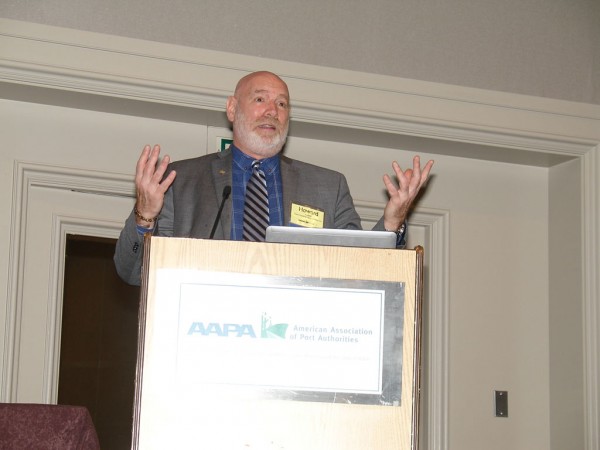Longtime ocean carrier executive Howard S. Finkel says rates are still too low as the American Association of Port Authorities’ 12th annual Planning for Shifting Trade Conference gets under way today [Jan. 30] in Tampa, Florida.
“I’d rather not talk about rates,” Finkel, executive vice president of COSCO Container Lines America Inc., the Secaucus, New Jersey-based arm of China Ocean Shipping (Group) Co , said in response to a question from AJOT. “It’s low. It’s better than it was.”
$2,100 to $2,200 “for lines to be healthy,” said Finkel, who has spent the past 24 years of his nearly four-decade industry career with COSCO, which this week began direct calls from Asia at Port Tampa Bay. Finkel added that typical present rates haven’t yet returned to that mark – obviously a far cry from the $5,000 to $6,000 for such a box when he began in the business with Sealand in 1981.

That said, Finkel remains optimistic, noting “fairly good” recent spot rates, adding, “I’m hoping we’re going to have a good contracting season.
“They’re called service contracts, but most aren’t about service, they’re about pricing,” he said, “and most of the prices are actually too low right now.”
U.S. trucking remains a significant concern in quoting intermodal rates that incorporate over-the-road transport, Finkel said, noting that COSCO is unable to ink full-year pacts pinning down truck costs.
Ship fuel expenses also are an issue, he said, and they are poised to further rise with implementation of stricter emissions standards.
“Bunker is something we have to be concerned about,” Finkel said, noting that most ocean carriers that saw losses in the past year failed to fully capture the rise in bunker fuel costs, which skyrocketed 45.2 percent from October 2017 to October 2018.
Finkel said he believes global carrier alliances, which now dominate the marketplace, can provide numerous benefits, including cost savings, enhanced operational efficiencies and optimized fleet development.
COSCO is one of four carriers in the OCEAN Alliance, which also includes CMA CGM, Evergreen and OOCL, the latter of which is now owned by COSCO.
Joining the hemispherewide AAPA in presenting the conference is the National Academies of Sciences, Engineering and Medicine’s Transportation Research Board. Offered in cooperation with the U.S. Maritime Administration, the event is being hosted by Port Tampa Bay at the Westin Tampa Waterside.
In opening the conference, A. Paul Anderson, Port Tampa Bay’s president and chief executive officer, said he anticipates further gains in container services at his Florida Gulf Coast port, commenting, “There’s more to come for us.”
Comprehensive coverage of the conference, including reception photos, is slated to appear in print in the Feb. 25 Florida ports edition of AJOT.

